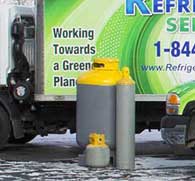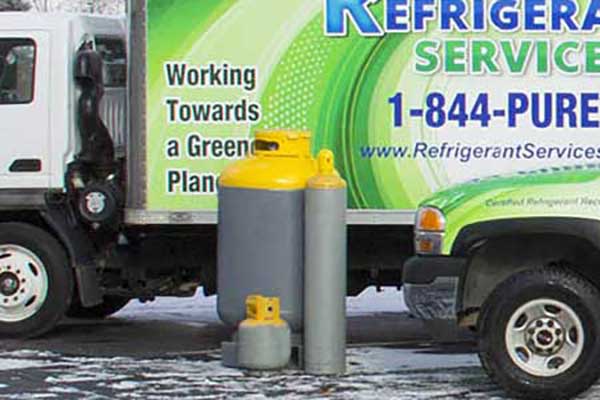2021 Michigan Refrigerant Reclamation | Refrigerant Services

Commercial refrigeration has experienced a big boom in recent years. Guaranteeing food quality and safety can only be satisfied by low temperature transport and storage to prevent bacterial growth. “Foodie” culture in particular emphasizes freshness and prevention of food borne illnesses, and any missteps are quick to be exposed online and in social channels—which means that refrigeration has becoming incredibly important in protecting many brands’ reputations. What does this mean for us? Refrigeration is going to be everywhere soon.
Energy efficiency and environmental impact
As time has gone by, the focus on energy efficiency in the HVAC industry has continually increased. Companies are constantly looking for new methods, technologies, and tools to be able to reduce waste. New energy-efficient heating and cooling technologies will become more available, giving companies new options to choose from. Efficient equipment can lead to savings down the line for both consumers and companies.
There’s been a lot of work done to try and find more eco-friendly refrigerants. HFC refrigerants worked for their purpose of minimizing damage to the ozone layer, but with the unfortunate side effect of contributing to greenhouse gas emissions. Natural refrigerants such as ammonia and carbon dioxide seem like the future, but the challenge is making them affordable enough and sustainable enough that they can be adopted by a wide swathe of the industry. Overall, regulations are pushing the refrigeration industry towards lower-GWP refrigerants. Various agencies are already taking action to reduce hydrofluorocarbon use by restricting sales of high-GWP refrigerants and proposing incentives for low-GWP refrigerant use. Generally, industry focus will be on energy savings and lowering environmental impact. Future-proofing a company’s systems will be the name of the game in this uncertain future.
What steps are being taken to minimize environmental impact?
Replacing traditional refrigerants with natural or low-GWP refrigerants has a significant impact on the greenhouse effect. In a traditional commercial enterprise which uses refrigerant heavily, such as a supermarket, replacing R404A can bring approximately a 20% reduction in total environmental impact. For newer natural refrigerants such as ammonia, leaks are generally irrelevant in terms of greenhouse effect. Refrigerant and HVAC companies are learning to deal with the fact that some natural refrigerants can be flammable. Training and protocols for handling refrigerants such as R290—a high purity version of propane suitable for use in the refrigeration and air conditioning industry—are gradually becoming more and more widespread. It’s just one side effect of having low-GWP natural refrigerants that are also effective for everyday use, but the industry as a whole has risen to meet the challenge.
Improving system efficiency and transitioning to new low-GWP refrigerants as mandated by current regulations—or ones about to be adopted—will significantly reduce the impact of commercial refrigeration. This is in spite of an overall increase in the number of HVAC and refrigeration systems in place.
The Montreal Protocol
The Montreal Protocol was originally meant to minimize and possibly reverse the damage to our ozone layer. Its main goal was to educate and spread awareness about the environmental effects of chlorofluorocarbons found in commonly-used refrigerants. Additionally, it launched global campaigns urging for the removal of these CFCs. Upon its enactment in 1987, an agreement to pull out or phase out the distribution and production of these harmful chemicals was signed by a majority of the world’s nations.
Ideally, the protocol mandates that the U.S. should have reduced its R-22 consumption by 90% in January 1, 2015. Although the EPA continues to strictly implement the guidelines on R-22 consumption, and has so far done a good job in doing so, a number of industrial users are still using or in possession of this type of refrigerant.
Businesses that don’t follow environmental protocols can be penalized heavily by the EPA, so hiring a competent, professional refrigerant services company to help you out is definitely a must.
Refrigerant Reclamation
Reclamation involves the re-processing and upgrading of a substance through such mechanisms as filtering, drying, distillation and chemical treatment. This is done to restore the substance to a specified standard of performance. Refrigerant reclamation can only be performed by a trained and experienced EPA-certified refrigeration technician, as the mishandling of these refrigerant gases can result in further depletion of the ozone layer.
Going forward, one thing that is for sure is the role of refrigerant reclamation. As technology advances and new solutions are found for refrigeration challenges, there is going to be a constant evolution of the kinds of refrigerants and HVAC units that will be on the market. As such, you’re going to want to have a reliable, proven refrigerant specialist on hand to help you transition to more effective technologies and more eco-friendly, low-GWP refrigerants. As a bonus, you may actually make money off of your old refrigerants, as refrigerant specialists will typically buy them back from you for a very good price. One of our trusted refrigerant specialists is Refrigerant Services LLC.
We at Level One HVAC are ready to respond to all your HVAC and Building Automation needs. Give us a call at (248) 486-6500 if you’d like to know more. If you don’t have time to call, you can fill in our online contact form and someone from our staff will be in touch with you shortly.
Visit our social media accounts for more information: Facebook Fan Page / Twitter Feed / Google+ Account / LinkedIn Company Page

